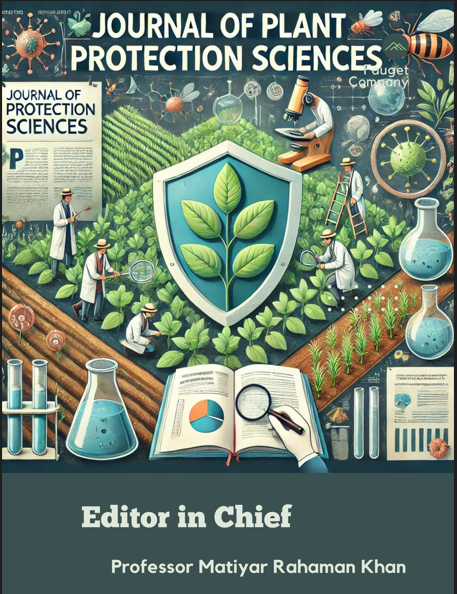Ethics and Malpractice
Publication Ethics and Publication Malpractice Statement
The Journal of Plant Protection Sciences (JPPS) adheres to the ethical standards and guidelines established by the Committee on Publication Ethics (COPE). We are committed to upholding these principles to ensure the highest quality and integrity of the research we publish.
Duties of Editors
-
Fair Play and Editorial Independence: Editors assess submitted manuscripts based solely on their academic merit, including importance, originality, validity, and clarity, without regard to the authors' personal characteristics or affiliations. Editorial decisions are independent of external policies or influences.
-
Confidentiality: Editors and editorial staff will keep all information about submitted manuscripts confidential, only sharing details with the corresponding author, reviewers, potential reviewers, and the publisher as necessary.
-
Disclosure and Conflicts of Interest: Editors will not use unpublished information from manuscripts for personal research and will recuse themselves from reviewing manuscripts where they have conflicts of interest.
-
Publication Decisions: Manuscripts are reviewed by at least two experts. The Editor-in-Chief makes the final decision on publication based on the manuscript’s validity, relevance, reviewers' feedback, and legal considerations. The Editor-in-Chief may consult with other editors or reviewers.
-
Involvement in Investigations: Editors will investigate and address ethical concerns regarding submitted or published papers, including publishing corrections or retractions as necessary.
Duties of Reviewers
-
Contribution to Editorial Decisions: Peer review supports editors in making informed publication decisions and can help authors improve their manuscripts.
-
Promptness: Reviewers who cannot review a manuscript promptly should decline the invitation to allow alternative reviewers to be contacted.
-
Confidentiality: Manuscripts must be treated as confidential documents and should not be shared or discussed outside the review process without explicit permission.
-
Standards of Objectivity: Reviews should be objective, with clear, evidence-based comments to assist authors. Personal criticism is not appropriate.
-
Acknowledgment of Sources: Reviewers should identify and cite relevant work that has not been cited by the authors and notify editors of any substantial similarities with other manuscripts.
-
Disclosure and Conflicts of Interest: Reviewers with conflicts of interest should disclose them and decline the review. Unpublished material must not be used in the reviewer’s own research without authors’ consent.
Duties of Authors
-
Reporting Standards: Authors must present an accurate account of their research and ensure their manuscript includes sufficient detail and references for replication. Fraudulent or inaccurate statements are unacceptable.
-
Data Access and Retention: Authors may need to provide raw data and should ensure data is accessible for at least 10 years after publication.
-
Originality and Plagiarism: Authors must submit original work and appropriately cite any used sources. Plagiarism in any form is considered unethical.
-
Multiple Submissions: Manuscripts should not be submitted to multiple journals simultaneously or published in more than one journal without prior agreement.
-
Authorship: Only those who have made significant contributions to the research should be listed as authors. All authors must approve the final version of the manuscript.
-
Disclosure and Conflicts of Interest: Authors must disclose any conflicts of interest and sources of financial support.
-
Acknowledgment of Sources: Authors should properly acknowledge all sources and obtain permission for using information obtained privately.
-
Hazards and Human or Animal Subjects: Authors must identify any hazards and ensure compliance with relevant laws and institutional guidelines for research involving human or animal subjects.
-
Peer Review: Authors must participate in the peer review process and respond promptly to review requests.
-
Fundamental Errors: Authors should notify the journal of any significant errors or inaccuracies in their published work and cooperate with corrections or retractions.
Duties of the Publisher
-
Handling Unethical Publishing Behavior: The publisher will take appropriate measures to address scientific misconduct, including publishing corrections or retractions as necessary.
-
Access to Journal Content: The publisher is committed to ensuring the permanent availability and preservation of scholarly research.
Peer Review Policy
-
Initial Manuscript Evaluation: The Editor evaluates all manuscripts and may reject those that do not meet the journal’s criteria. Manuscripts that meet the criteria are sent for peer review.
-
Type of Peer Review: JPPS employs double-blind peer review, where both the author and reviewer remain anonymous.
-
Selection of Referees: Referees are chosen based on their expertise, and the database is continually updated.
-
Review Reports: Referees evaluate the manuscript’s originality, methodological soundness, ethical compliance, clarity of results, and proper referencing.
-
Review Duration: The review process duration depends on referees' responses. In rare cases, a single report may be used if a second referee cannot be found.
-
Final Report: The Editor makes the final decision on the manuscript based on the referees' recommendations and provides feedback to the author.
-
Becoming a Referee: Individuals interested in becoming referees should contact the editor. Refereeing offers the opportunity to engage with current research and contribute to maintaining scientific integrity.

